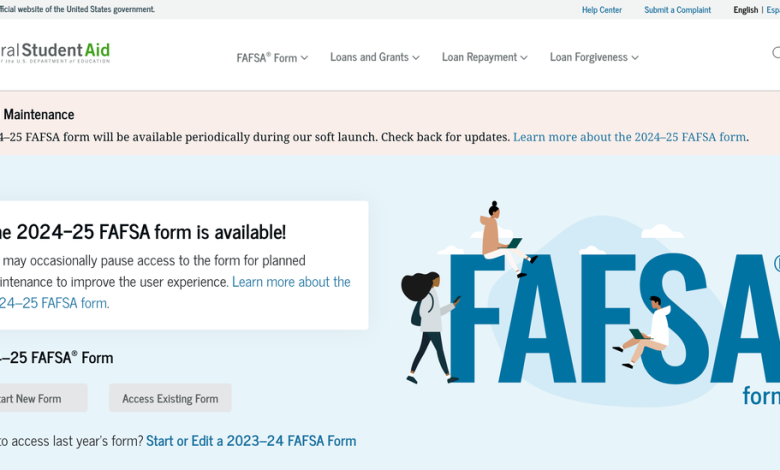I Spent New Year’s Eve Trying to Do the FAFSA. It Didn’t Go Well.

Since 2020, when Congress ordered up simplification of the federal financial aid system, the U.S. Department of Education has faced the complex task of actually making the changes to the ever-important formula for determining who gets what.
Grants and loans hinge on the inputs and outputs of the dreaded FAFSA form, which is normally available on Oct. 1. The new form was supposed to debut in 2023, but the department toiled away on it long past October, through November and into December.
The government promised to fling the digital doors open by the end of December. My big kid is going to college this fall, so I spent Sunday afternoon and evening trying to access the site and complete the form.
Completion proved elusive. Here’s what happened.
I began around 2 p.m., and the FAFSA (short for Free Application for Federal Student Aid) website greeted me ominously: “The FAFSA form is available periodically while we monitor site performance and update the form to provide you with a better experience.”
It wasn’t available then, or in the 3, 4, 5, 6, or 7 p.m. hours. I started documenting my quest on Threads.
Coincidentally (or not), I got an email out of the blue during the 6 p.m. hour from Johanny Adames, a department press secretary, preemptively declaring our communication off the record. (That’s a negotiation, not a dictate, in my journalism rule book.)
But the message merely pointed me to a public announcement from the department, which noted that the promised FAFSA availability in December was in fact a “soft launch” where the form would be available for “periods of time over the coming days.” Nevertheless, the statement included the following: “Students and families will be able to complete and submit the 2024-25 FAFSA form online by Dec. 31.”
That felt like a promise, or at least a dare, so I pressed on. In the 8 p.m. hour, a Threads user named “jkvaal” started following me. Was it James Kvaal, the under secretary at the Education Department who oversees higher education? I wasn’t trying to ruin anyone’s evening except maybe my own. (My family was elsewhere until later, and my 18-year-old was helping me remotely.)
Then, also in the 8 p.m. hour, success! The site opened, and I managed to answer several questions in the “Personal Circumstances” section, which is the first of five sections that could together contain as few as 18 queries, down from as many as 100 or more in previous versions of the form.
The site design was clean. The user interface was reasonably friendly. But things were not always clear. At one point, the site was telling me that both my daughter and I had already started forms when in fact neither of us had, at least as far as I could tell.
Eventually, I forged ahead, but I didn’t get much further. There was no way, via my daughter’s login, to send the email to me that would allow me to grant the Internal Revenue Service permission to push income data into the form. Well, there was a way, but the email button didn’t work.
Did the form save our data? It was supposed to, but I couldn’t be sure. There was an indication that the Social Security Administration was reviewing her income history file, so that’s not nothing. Once I logged out and tried to log in again to fix the email-your-dad problem, the entire site was once again unavailable.
The Education Department did not respond to a request for comment.
It was not necessary for me — or anyone — to try to complete the form as soon as the site became available. If you need to fill out a FAFSA this year, the department won’t even be sending your information to colleges until “later in January.” That said, college financial aid administrators sure would like to have the information as soon as possible.
The department faces an enormous task here. I have every sympathy for the government employees who need to tilt up a website that more than 15 million people are probably going to use in the coming months. Department staff probably worked through Christmas, and hats off to them.
That said, I wish they’d waited another year and gotten this right by late in the summer, so everyone could have a full academic-year cycle to get used to the new form and formulas for determining aid. It’s too late for that, alas, so I’ll keep flinging myself at this thing as if this was Ticketmaster and Beyoncé tickets were on the line. Luckily, federal student loan funds don’t run out, let alone as fast as stadium seats disappear.
